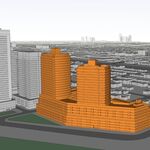I know how it works elsewhere. I just don't buy that we'll see that here. At least not for a long time. There's a couple of reason. In Europe, every country really only has one city with solid international (non European short-haul) air service (this is actually why Emirates, Qatar Airways and Etihad are proving to be such huge disruptors), with perhaps Germany as the exception. They also don't have massive amounts of internal air travel, requiring major airports in those other cities. In France, using rail to feed Paris, let's them save on additional airports elsewhere. In the TOM triangle, I could see some re-arrangements (for example, Ottawa residents more regularly using Dorval). But I cannot foresee any scenario where AC drops hourly flights from Pearson to Ottawa and Montreal. Smaller aircraft, possibly. Cuts beyond an hourly schedule. Not possible. What possible reason would AC have to redirect all their international passengers to check-in at Pearson? They lose out on the revenue from the portion of the trip to Toronto. And they overload an already crowded node, while they still don't shed other airports.
Perhaps if AC was an investor in any HSR service. Even then, it's a tall order for HSR to match the convenience you have today. You check in an hour before, and then fly for an hour and you're at Pearson. You're bags are checked through. Two hours later you're on to your international destination. To achieve anything equivalent, any HSR would have to make it from Montreal or Ottawa to Pearson in less than 2.5 (allowing 1.5 hrs) to check-in. I can barely see them pulling off 2.5 hrs from Gare Central to Union.
In any event, I think we're talking around each other. I fully accept that HSR will impact aviation in the TOM triangle. What I am disputing is that it will significantly reduce traffic flows. We're largely at hourly flights today (with a few extra in the morning and evening), for Porter and AC, with varying aircraft sizes (Porter at 70 seats, AC using 180 seat A321s down to 73 seat E75s) and Westjet with essentially "rush-hour service" (cluster in the morning, cluster in the evening, one or two at mid-day, one or two at night). This is not anywhere close to what the famed Madrid-Barcelona route had, prior to HSR. That route essentially saw a departure every 15 mins or less (actually closer to every 5-10 mins at peak hours), all airlines considered. We won't see that in the TOM triangle anytime soon. Even if you add up all Westjet, AC and Porter flights today, you don't get more than 3 flights per sector per hour (with some notable exceptions in the early mornings and after the work day). This is why I can't see a huge reduction in the number of flights. Lose the rush hour service to trains. But other than that, same as today, with smaller planes. Ultimately, HSR is not going to get built as Air Canada's feeder network for Ontario and Quebec. If it gets built, the business case for this lies elsewhere.






